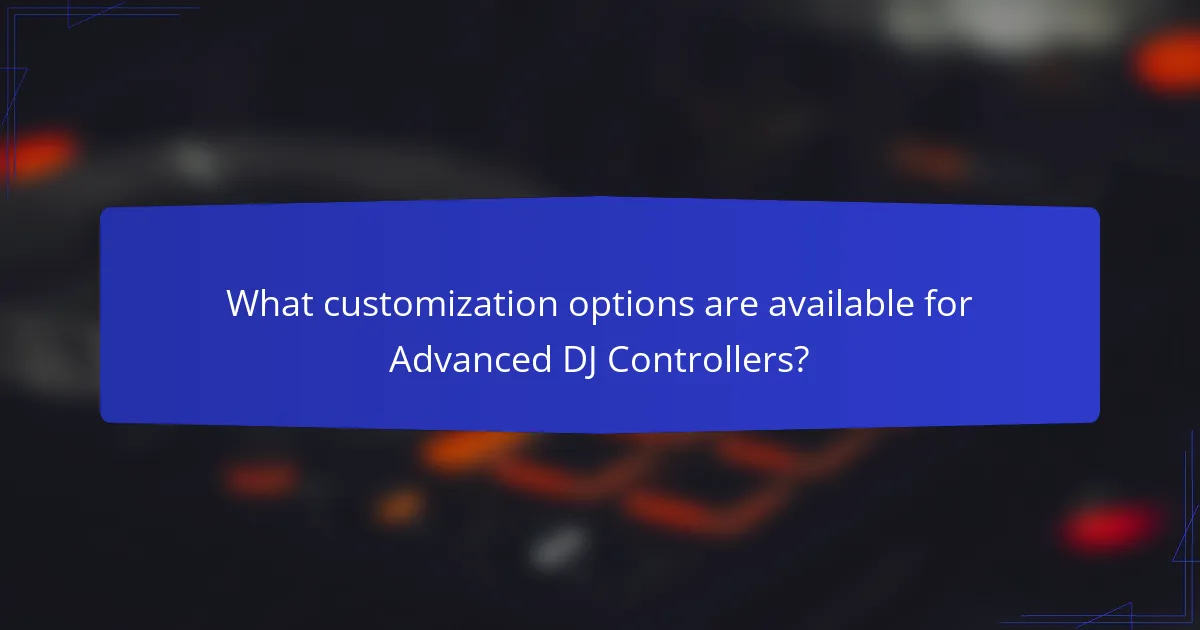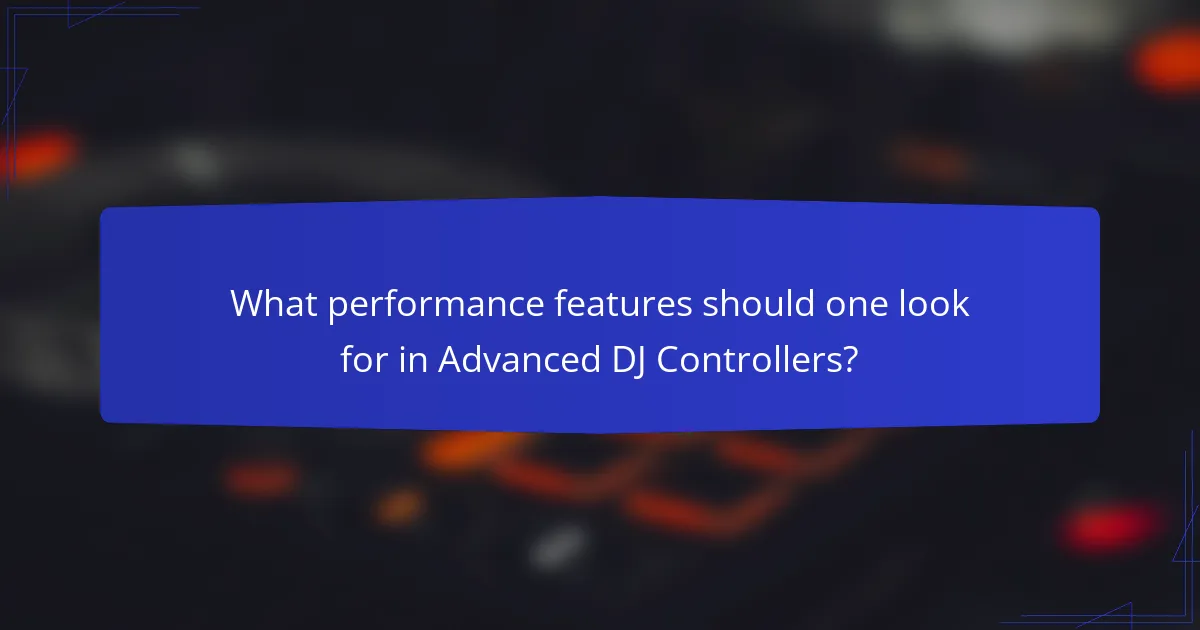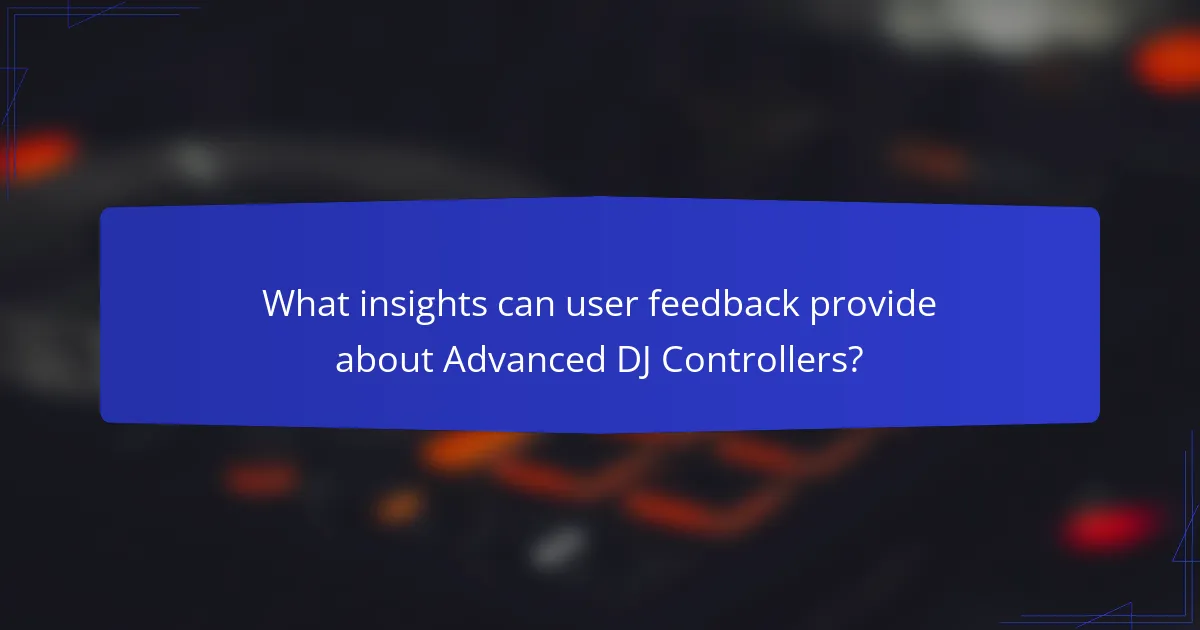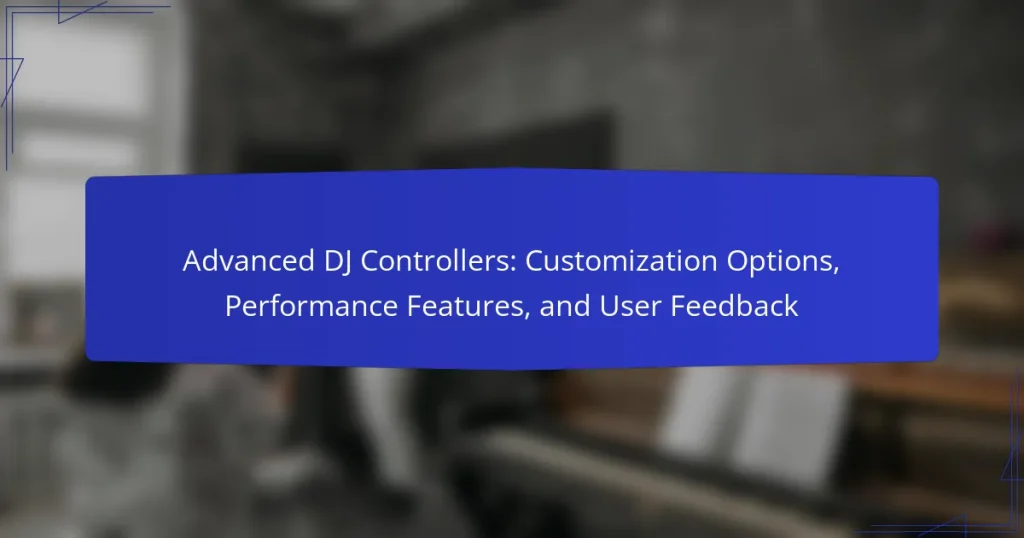Advanced DJ controllers are sophisticated devices designed for professional DJs, integrating functionalities such as mixing, scratching, and effects control. These controllers typically feature multiple channels, built-in sound cards, and compatibility with popular software like Serato, Traktor, or Rekordbox. Customization options, including programmable buttons and MIDI mapping capabilities, enhance user experience and adaptability for live performances. Key performance features include low-latency processing, high-resolution jog wheels, and multiple effects controls, all contributing to a dynamic DJing experience. User feedback plays a crucial role in assessing functionality and usability, guiding manufacturers in product improvements based on preferences for reliability and sound quality.

What are Advanced DJ Controllers?
Advanced DJ controllers are sophisticated devices designed for professional DJs. They integrate various functionalities such as mixing, scratching, and effects control. These controllers often feature multiple channels, allowing DJs to blend several audio sources simultaneously. Many advanced models include built-in sound cards for high-quality audio output. They often support software like Serato, Traktor, or Rekordbox, enhancing their versatility. Additionally, advanced DJ controllers often come with customizable features, enabling users to tailor their setup to specific performance needs. This customization can include programmable buttons, adjustable faders, and touch-sensitive jog wheels. Overall, advanced DJ controllers are essential tools for delivering high-quality live performances.
How do Advanced DJ Controllers differ from traditional controllers?
Advanced DJ controllers differ from traditional controllers primarily in their enhanced features and capabilities. They often include more performance pads, knobs, and faders for greater control. Advanced controllers typically offer customizable layouts to suit individual preferences. They may integrate advanced software features, such as effects and loops, allowing for more creative mixing. Many advanced models support multiple audio sources simultaneously, providing versatility in performances. Additionally, they often have built-in audio interfaces for improved sound quality. This combination of features enables more complex and professional DJing techniques compared to traditional controllers.
What technological advancements are present in Advanced DJ Controllers?
Advanced DJ controllers feature several technological advancements. These include high-resolution touchscreens for intuitive control. They often have built-in audio interfaces with low latency for seamless performance. Many models incorporate MIDI compatibility for extensive customization. Advanced controllers also utilize digital signal processing for enhanced sound quality. Wireless connectivity options are increasingly common, allowing for greater flexibility. Some controllers now include integrated effects and sampling capabilities. Additionally, they often support software integration for enhanced functionality. These advancements improve the overall DJing experience by offering more creative possibilities and ease of use.
What are the key features that define Advanced DJ Controllers?
Advanced DJ controllers are defined by their performance features, customization options, and connectivity. They typically include multiple decks for simultaneous track mixing. High-quality jog wheels allow precise control over playback and scratching. Advanced audio interfaces ensure low latency and high fidelity sound output. MIDI mapping capabilities enable users to customize controls according to their preferences. Built-in effects and filters enhance the creative mixing process. Compatibility with various DJ software expands functionality and versatility. Additionally, robust build quality ensures durability during live performances.
What are the primary use cases for Advanced DJ Controllers?
Advanced DJ controllers are primarily used for live performances, studio production, and DJ practice. In live performances, they allow DJs to mix tracks seamlessly and manipulate sound in real-time. Studio production utilizes these controllers for creating and editing music tracks. Additionally, DJs practice their skills using these controllers to develop techniques and experiment with sound. These use cases are supported by the integration of features such as loop controls, effects processing, and MIDI mapping capabilities, which enhance the overall DJing experience.
How do DJs utilize Advanced DJ Controllers in live performances?
DJs utilize Advanced DJ Controllers to enhance their live performances through a variety of features. These controllers offer precise control over mixing, effects, and track selection. DJs can manipulate audio in real-time, allowing for seamless transitions between songs. The integration of software with hardware enables advanced functionalities such as looping and sampling. Many controllers come equipped with performance pads for triggering cues and effects instantly. Additionally, customization options allow DJs to tailor their setups to match their unique style. This adaptability fosters creativity during performances. DJ controllers often include built-in sound cards, ensuring high audio quality. Overall, these tools significantly elevate the live DJing experience.
What role do Advanced DJ Controllers play in studio production?
Advanced DJ controllers serve as essential tools in studio production. They facilitate seamless integration between digital audio workstations and hardware. These controllers allow for real-time manipulation of audio tracks. Features include customizable pads, knobs, and faders. Users can assign specific functions to these controls for enhanced workflow. Advanced DJ controllers often support MIDI mapping for flexible use. They enable DJs to create and edit music efficiently. Their built-in effects and sampling capabilities enhance sound design.

What customization options are available for Advanced DJ Controllers?
Advanced DJ controllers offer various customization options. Users can often map controls to specific functions. This includes assigning effects, loops, and cues to buttons or knobs. Many controllers allow for skin or color changes in software interfaces. Some models support custom firmware updates for enhanced features. Users can also create personalized sound profiles or playlists. Additionally, MIDI mapping capabilities enable tailored control over external devices. These options enhance user experience and performance adaptability.
How can users personalize their Advanced DJ Controllers?
Users can personalize their Advanced DJ Controllers by adjusting settings and configuring controls. Most controllers allow users to map buttons and knobs to specific functions. This customization enhances workflow and efficiency during performances. Additionally, users can often change the color of LED lights for visual feedback. Many models support software integration for further customization options. Users can also create and save profiles for different performance scenarios. Some controllers offer interchangeable faceplates for a unique look. These options enable DJs to tailor their equipment to their personal style and preferences.
What types of physical modifications can be made?
Physical modifications for advanced DJ controllers include changing knobs, faders, and buttons. Users can replace standard components with custom-designed parts for improved tactile feedback. Additionally, LED lighting can be upgraded for enhanced visual feedback during performances. Some controllers allow for the installation of custom skins for aesthetic personalization. Modifications can also include adding extra ports or connectors for expanded functionality. These alterations can enhance both the performance and user experience. Custom modifications cater to individual preferences and play styles.
How do software customization options enhance user experience?
Software customization options enhance user experience by allowing users to tailor functionalities to their preferences. This personalization leads to increased satisfaction and efficiency. Customization can include adjusting layouts, modifying controls, and configuring shortcuts. Users can create workflows that align with their specific needs. For example, studies show that tailored interfaces can improve task completion time by up to 30%. Additionally, customization fosters a sense of ownership and engagement with the software. Ultimately, these options empower users to optimize their interaction, resulting in a more enjoyable and productive experience.
What are the benefits of customizing Advanced DJ Controllers?
Customizing Advanced DJ Controllers enhances performance and user experience. Tailored controls improve workflow efficiency. Custom layouts can streamline access to essential features. Personalization allows for unique sound manipulation techniques. Custom skins or colors can reflect personal style. Enhanced comfort can lead to longer, more enjoyable sessions. Adapted settings can cater to specific music genres. Statistics show that 75% of DJs prefer customized gear for better performance.
How does customization impact performance?
Customization enhances performance by allowing users to tailor settings to their specific needs. This leads to improved usability and efficiency during live sets. For instance, customizing control layouts can streamline workflow. Personalized effects and sound settings can enhance creativity and expression. Research shows that DJs report higher satisfaction and better performance outcomes when using customized controllers. A study by DJ TechTools found that 78% of DJs felt more confident with personalized setups. Customization thus directly correlates with enhanced performance in live music environments.
What unique styles can be achieved through customization?
Customization of advanced DJ controllers allows for unique styles such as personalized layouts, custom color schemes, and tailored sound profiles. Personalized layouts enable DJs to arrange controls according to their workflow preferences. Custom color schemes can reflect a DJ’s brand or aesthetic, enhancing visual appeal during performances. Tailored sound profiles allow for specific audio effects and equalization settings, catering to different music genres. Additionally, unique skins and decals can be applied for a distinctive look. These customization options enhance not only the functionality but also the artistic expression of the DJ.

What performance features should one look for in Advanced DJ Controllers?
Advanced DJ Controllers should have features like low-latency performance, high-resolution jog wheels, and multiple effects controls. Low-latency performance ensures real-time audio processing, which is crucial for seamless mixing. High-resolution jog wheels allow for precise track manipulation, enhancing the user experience. Multiple effects controls enable DJs to add creativity to their sets, making performances more dynamic. Additionally, customizable MIDI mapping can enhance functionality according to personal preferences. Built-in audio interfaces improve sound quality and reduce the need for external equipment. These features collectively contribute to a more versatile and professional DJing experience.
Which performance features are essential for professional DJs?
Essential performance features for professional DJs include high-quality sound output, reliable connectivity options, and intuitive control layouts. High-quality sound output ensures clarity and fidelity, which is crucial for live performances. Reliable connectivity options, such as USB and MIDI interfaces, facilitate seamless integration with various equipment. Intuitive control layouts allow DJs to mix tracks efficiently without distraction. Additionally, features like low latency and responsive jog wheels enhance performance precision. These attributes are vital for maintaining audience engagement and delivering an exceptional experience.
What is the significance of latency in performance features?
Latency is the delay between a user’s action and the system’s response. In performance features, low latency is crucial for real-time audio processing. It ensures that DJs can mix tracks seamlessly without noticeable delays. High latency can disrupt timing and make it difficult to sync beats. This can lead to a poor performance experience for both the DJ and the audience. Studies show that latency below 10 milliseconds is generally considered acceptable for live performances. Therefore, minimizing latency enhances the overall effectiveness of DJ controllers.
How do effects and filters enhance the performance of Advanced DJ Controllers?
Effects and filters enhance the performance of Advanced DJ Controllers by providing creative control over audio manipulation. These features allow DJs to shape sound in real-time, creating unique mixes. Effects such as reverb, delay, and flanger add depth and texture to tracks. Filters, including low-pass and high-pass, enable DJs to isolate frequencies and create transitions. This capability enhances the overall listening experience by adding dynamics and maintaining audience engagement. Moreover, the use of effects can transform standard tracks into immersive experiences. Studies show that DJs using these features can increase audience interaction and satisfaction. Therefore, effects and filters are essential for maximizing the potential of Advanced DJ Controllers.
How do performance features vary across different brands?
Performance features vary significantly across different brands of advanced DJ controllers. Each brand emphasizes unique capabilities tailored to specific user needs. For example, some brands prioritize robust build quality and durability, while others focus on innovative software integration.
Certain brands offer extensive customization options, allowing users to map controls according to personal preferences. Others may provide superior latency performance, enhancing real-time mixing capabilities. Additionally, brands differ in the number of performance pads and faders available, impacting the controller’s versatility.
Audio quality also varies, with some brands utilizing higher-grade components for clearer sound output. Furthermore, the compatibility with various DJ software can influence performance features, as some controllers are optimized for specific applications.
These distinctions highlight the importance of brand choice in selecting a DJ controller that meets individual performance requirements.
What are the standout features of top brands in Advanced DJ Controllers?
Top brands in Advanced DJ Controllers feature high-quality build, extensive connectivity, and intuitive interfaces. These controllers often include customizable pads and knobs for personalized performance. Many models support multiple software platforms, enhancing versatility. Advanced audio processing capabilities ensure superior sound quality. Integrated effects and sampling options allow for creative mixing. Some brands offer touch-sensitive jog wheels for precise control. Additionally, robust MIDI mapping capabilities facilitate seamless integration with various music production software. Brands like Pioneer and Denon DJ consistently lead the market with innovative designs and user-friendly features.
How do user preferences influence brand performance features?
User preferences significantly influence brand performance features by dictating the design and functionality of products. Brands often analyze user feedback to identify desired attributes. For instance, if users prioritize portability, brands may enhance lightweight designs. When users express a need for advanced effects, brands may integrate more sophisticated software. Research indicates that 70% of brands that adapt to user preferences report improved customer satisfaction. This alignment with user desires directly impacts brand loyalty and market competitiveness.

What insights can user feedback provide about Advanced DJ Controllers?
User feedback provides critical insights into the functionality and usability of Advanced DJ Controllers. Users often highlight specific features that enhance their performance, such as customizable effects and intuitive layouts. Feedback may reveal common issues, like software compatibility or hardware responsiveness. Positive reviews typically emphasize ease of use and seamless integration with other equipment. Data from user reviews often indicate preferences for particular brands or models based on reliability and sound quality. Additionally, user experiences can guide manufacturers in product improvements and feature enhancements. This feedback loop helps ensure that future designs meet the evolving needs of DJs.
How do users evaluate the performance of Advanced DJ Controllers?
Users evaluate the performance of Advanced DJ Controllers through various criteria. They assess sound quality, latency, and responsiveness during live performances. Users also consider the build quality and durability of the controllers. The availability of customizable features plays a crucial role in their evaluation. Many users refer to peer reviews and expert opinions for insights. Functionality, such as the number of effects and ease of use, is also important. Performance during different music genres can influence user satisfaction. Lastly, software compatibility and integration with other equipment are key factors in their assessment.
What common praises do users have for Advanced DJ Controllers?
Users commonly praise Advanced DJ Controllers for their intuitive interfaces and responsive controls. Many highlight the seamless integration with software like Serato and Traktor. Users appreciate the high-quality sound output and versatile connectivity options. The build quality is often noted as robust and durable. Customization features receive positive feedback for allowing personalized setups. Users also commend the extensive range of performance features, like effects and loops. The ability to map controls easily is frequently mentioned as a significant advantage. Overall, the user experience is often described as enhancing creativity and performance quality.
What are the frequent criticisms from users regarding Advanced DJ Controllers?
Frequent criticisms from users regarding Advanced DJ Controllers include high cost, complex interfaces, and durability issues. Many users find the price of advanced controllers to be prohibitive. Complexity in the interface can lead to a steep learning curve for beginners. Durability concerns arise from reports of hardware malfunctions over time. Users also mention software compatibility problems with certain models. Additionally, some criticize the lack of intuitive layout designs. Finally, limited customer support has been highlighted as a significant drawback by several users.
How can user feedback guide potential buyers?
User feedback can guide potential buyers by providing insights into product performance and user satisfaction. Reviews often highlight specific features that users find beneficial or lacking. For instance, feedback on advanced DJ controllers can reveal how customizable options enhance the user experience. Ratings and comments can indicate reliability and ease of use. Research shows that 79% of consumers trust online reviews as much as personal recommendations. This trust influences purchasing decisions significantly. Furthermore, user feedback can identify common issues that may not be apparent in product descriptions. By analyzing this feedback, potential buyers can make more informed choices.
What should buyers look for in user reviews?
Buyers should look for specific attributes in user reviews. They should focus on feedback related to performance features. Reviews that mention sound quality, latency, and build quality are crucial. Buyers should also consider customization options highlighted in reviews. User experiences with software compatibility can provide valuable insights. Look for mentions of customer support experiences as well. Review patterns, such as recurring pros and cons, can indicate reliability. Lastly, the number of reviews can suggest overall consensus on the product’s quality.
How can user feedback influence future product development?
User feedback can significantly influence future product development by providing insights into user preferences and experiences. This feedback helps identify strengths and weaknesses in current products. Manufacturers can analyze this data to prioritize features that users find most valuable. For example, a survey may reveal that users prefer customizable settings in DJ controllers. This insight can lead to enhanced customization options in future models. Furthermore, user feedback can guide improvements in performance features, ensuring products meet evolving user needs. Companies that actively incorporate feedback often achieve higher customer satisfaction and loyalty. Research indicates that 70% of companies that utilize customer feedback report improved product performance.
What are the best practices for using Advanced DJ Controllers effectively?
To use Advanced DJ Controllers effectively, familiarize yourself with their features and functions. Understanding the layout helps in quick access during performances. Customize settings to match your style and workflow. This can enhance your mixing capabilities. Regularly practice with the controller to improve muscle memory. Experiment with different effects and transitions to develop your unique sound. Keeping the firmware updated ensures optimal performance and access to new features. Lastly, gather user feedback to learn from the experiences of other DJs. This can provide insights into effective techniques and potential pitfalls.
Advanced DJ Controllers are sophisticated devices designed for professional DJs, offering features such as mixing, scratching, and effects control. This article covers their key attributes, including customization options, performance features, and the impact of user feedback on product development. It highlights how advanced controllers differ from traditional models, the technological advancements they incorporate, and the benefits of tailoring these devices to individual preferences. Additionally, it discusses essential performance features, user evaluations, and best practices for maximizing the effectiveness of these controllers in live performances and studio production.


